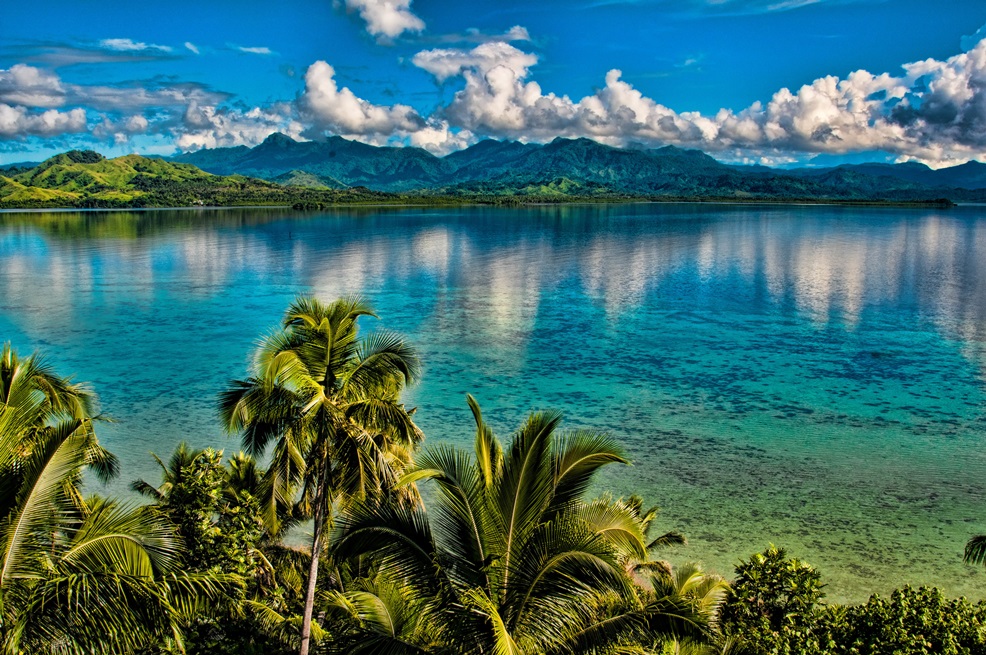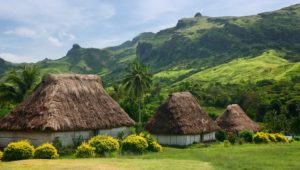On a muddy beach, under the glaring Fiji sun, villagers living on the banks of Laucala Bay in the capital of Suva carefully plant neat rows of mangrove seedlings as holidaymakers and locals swim in the ocean in the distance.
What started as a hobby for Jim Tuimoce and the small Korova community has now become a serious attempt to guard them against the effects of rising seas and protect their way of life.
The Pacific island nation is seen as particularly vulnerable to climate change, with some of its 300 low-lying islands susceptible to rising seas, and much of its coastal mangroves forests have been destroyed by badly-planned development and unsustainable resource use.
“The land has been washed away over the past 20 years. We plant mangroves here to protect the soil from eroding more,” said Tuimoce, 28, who lives with seven families in this coastal village that still uses traditional canoes to fish.
Environmental restoration—along with traditional governance, quality and affordable education, plus youth and women issues—were some of the key issues recently raised to the Pacific Islands Forum Secretariat from the Pacific Regional CSO Forum in Suva, Fiji.
The issues raised by more than 40 CSO reps from over 10 countries in the Pacific region were discussed with a representative from the Pacific Islands Forum Secretariat Non State Actors Programme during a session at the Pacific Regional CSO Forum at the University of the South Pacific in Suva on December 4-7, 2017.
Facilitated by the Pacific Islands Association of NGOs, the forum includes CSO representatives from Samoa, Tonga, Cook Islands, Niue, New Zealand, Fiji, Vanuatu, Papua New Guinea, Solomon Islands, Palau, RMI, Federated States of Micronesia, Tuvalu and Kiribati.
PIANGO Executive Director Emele Duituturaga said she was glad that PIFs was willing to carry out the consultations during the Forum and allowed submissions to be made by their national liaison unit representatives in Suva.
“CSO’s must use spaces as such to discuss regional policies and its impact and highlight the links to their national and grassroots experiences,” Duituturaga said. “Yesterday we were reminded by CSO Partnership for Development Effectiveness CPDE) co chair, Beverly Longid that if we are not rooted in our grassroots communities we have no business advocating for human rights.”
“It is a call to revisit why we do what we do as civil society organisations in the Pacific particularly in the work for sustainable development. We are glad that the opportunity was given to our national liaison units to participate in this regional policy submission process and we acknowledge the PIFs for facilitating it at this Forum,” she added.
The meeting was supported by CPDE, International Forum for National NGO Platforms (IFP) and the European Union.
In his opening remarks, Fiji President Major General (Ret’d) Jioji Konrote said “Fiji is grateful to the world’s civil society leaders and activists for their support of the Pacific region’s efforts to address climate change.”
He urged civil society to continue to assist in what is likely humanity’s biggest challenge. “We cannot afford to fail in our mission,” he said. “We must keep this issues atop the global agenda,” he added. “Our ultimate goal is to help save Planet Earth and humanity at large, and to leave no one behind,” he told a full-house crowd of 600-plus at Novotel Hotel, about six kilometers from the Fiji capital.
This was the first ICSW held in the Pacific region. The event, which is organised by CIVICUS World Alliance for Citizen Participation every 18 months, is co-organised this year by CIVICUS and the Pacific Islands Association of Non-Governmental Organisations (PIANGO). CIVICUS chairperson Anabel Cruz, in her address last night, reaffirmed CIVICUS’ commitment to amplify Pacific voices. She said, “We are a world alliance of people and organisations aimed to support citizen participation and to strengthen civil society,” and that they were “here in full willingness to learn and interact.”
“The theme for ICSW is ‘Our planet. Our struggle. Our future’, because we all want a sustainable planet for our future generations,” said Ms Cruz. “We respect and support the struggles of our sisters and brothers in the Pacific to get open civic spaces for our people and organizations.”
PIANGO chairperson Sarah Thomas-Nededog also addressed the international and regional delegation, which altogether represent 109 countries. She hoped international delegates would gain a better understanding of the Pacific’s concerns by the end of the week. “Help us to tell our stories,” she said. “Tell them we are a beautiful passionate people. Tell them we are peaceful and we embrace all peoples from all around the world. Tell them about the resiliency and how are able to stand up after all kinds of challenges, including storms, hurricanes and whatever that may come our way.”
She urged them to explore the region’s realities of displacement. “The Pacific people are already leaving their homes and are homeless,” explained Ms. Thomas-Nededog. “Please tell them that seabed mining is causing our fish and creatures of the ocean to be distressed threatening fishing for families and preserving our way of life. Tell them that there still some of us that are not truly free and have not exercised our right to self-determination.”
The issues raised by more than 40 CSO reps from over 10 countries in the Pacific region were discussed with a representative from the Pacific Islands Forum Secretariat Non State Actors Programme during a session at the Pacific Regional CSO Forum this morning at the University of the South Pacific, Suva, Fiji.
PIANGO Executive Director Emele Duituturaga said she was glad that PIFs was willing to carry out the consultations during the Forum and allowed submissions to be made by their national liaison unit representatives in Suva.
“CSO’s must use spaces as such to discuss regional policies and its impact and highlight the links to their national and grassroots experiences,” Duituturaga said.
“Yesterday we were reminded by CSO Partnership for Development Effectiveness CPDE) co chair, Beverly Longid that if we are not rooted in our grassroots communities we have no business advocating for human rights.”
“It is a call to revisit why we do what we do as civil society organisations in the Pacific particularly in the work for sustainable development,” Duituturaga said. “We are glad that the opportunity was given to our national liaison units to participate in this regional policy submission process and we acknowledge the PIFs for facilitating it at this Forum.”
“The consultation gave our NLUs the opportunity to engage, highlight and debate some of their issues and challenges and start the process of prioritising needs as something our regional leaders can consider,” Duituturaga added.
Duituturaga also acknowledged the important role of partnerships in civil society work particularly in advancing the Agenda 2030. “Our partnership with the International Forum for National NGO Platforms in this regard has been crucial to the preparatory work on SDGs that we have done between 2016 -2017,” he concluded.
Photos of Fiji via Adobe Stock.


